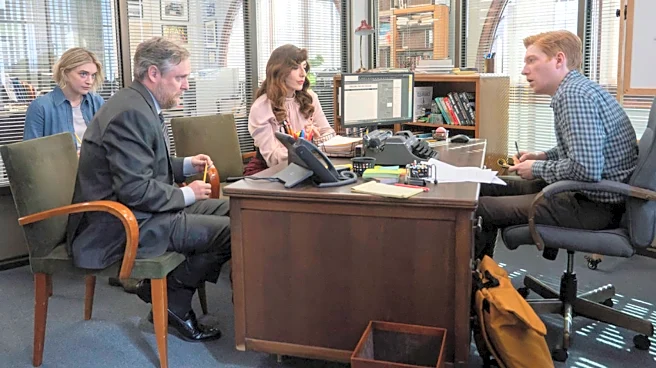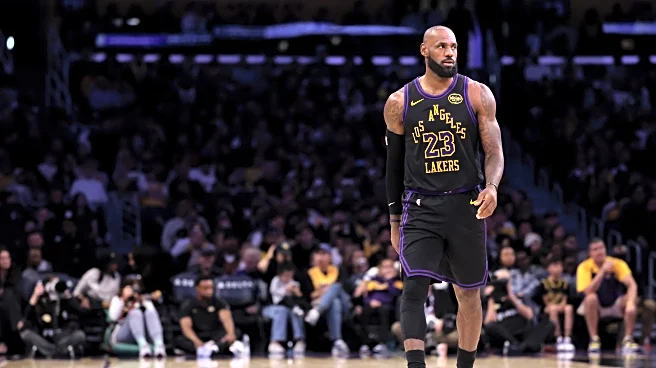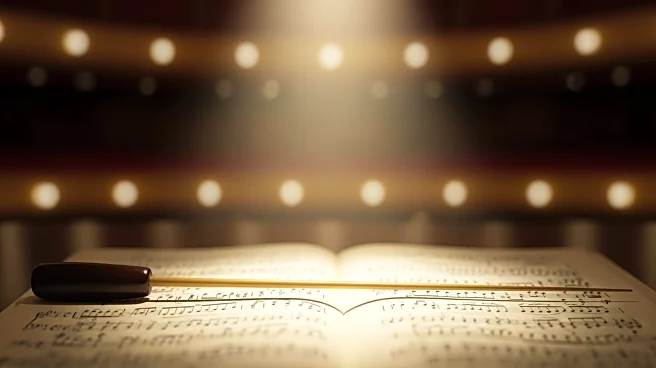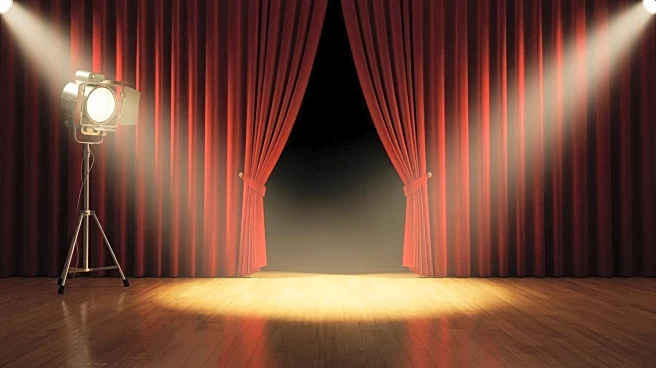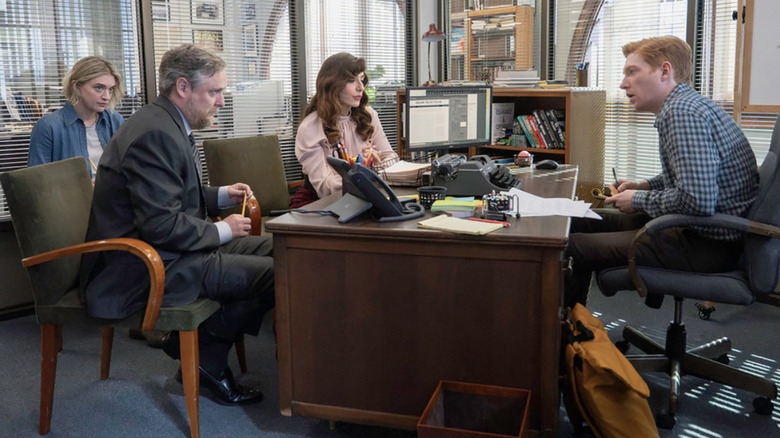
It's easy to forget that the American adaptation of "The Office" had a rough start. Not only was anyone who had seen the original British version of the workplace mockumentary firmly against a remake of the brilliant
series, but the short, six-episode first season was barely anything more than a carbon copy of the UK's debut season. Because of this, "The Office" almost didn't come back for a second season. But as we all know, creator Greg Daniels and his writing staff figured out how to use Steve Carell's bumbling but ambitious Dunder Mifflin paper company manage Michael Scott as the butt of many jokes without making him totally unlikeable and combined that with a lovely blossoming romance among employees Jim and Pam (John Krasinski and Jenna Fischer). The result was one of the most influential comedy shows of all time and one of NBC's biggest hits ever. Even in the age of streaming, "The Office" was reigning supreme on Netflix before it shifted over to Peacock.
That brings us to "The Paper," NBCUniversal's first attempt to capitalize on the success of "The Office" in the form of a Peacock spin-off series that takes place in the same universe. Trying to match up to the reputation and prowess of "The Office" is a tall order, and that's likely why, rather than building a show around a familiar character from Dunder Mifflin, the same documentary crew from "The Office" is used as the link between the two shows. After they discover the fate of the once successful paper company, they take their cameras from Scranton, Pennsylvania to Toledo, Ohio and discover that the local newspaper, the Toledo Truth Teller, is about to find itself in a state of reinvention and reinvigoration.
Without giving away exactly what happened with Dunder Mifflin, let's just say the Toledo Truth Teller shares offices with one of the paper company's subsidiaries when it came under new corporate ownership. The newspaper has their staff in cubicles on one side of the floor of an upper-level business building in downtown Toledo, and on the other side are the employees of Softees, a long-running toilet paper company. That might seem like an odd juxtaposition, and it's not only used for intermittent comedic effect, but it actually has an important part to play later in one of the first season's best episodes.
This is all merely laying the groundwork for how "The Paper" exists in the same universe as "The Office." As a whole, the show does a miraculous and admirable job of fitting into the mockumentary world that Greg Daniels previously created without feeling like a carbon copy of "The Office." Rather than lazily trying to ride the coattails of its predecessor, the 10-episode first season of "The Paper" (provided in its entirety to press ahead of its premiere) carves out its own path and operates smoothly as a consistently funny and irresistibly charming successor that simultaneously acts as a love letter to good, old-fashioned local journalism.
Read more: The 30 Best Sitcoms Of All Time, Ranked
Where The Paper Begins
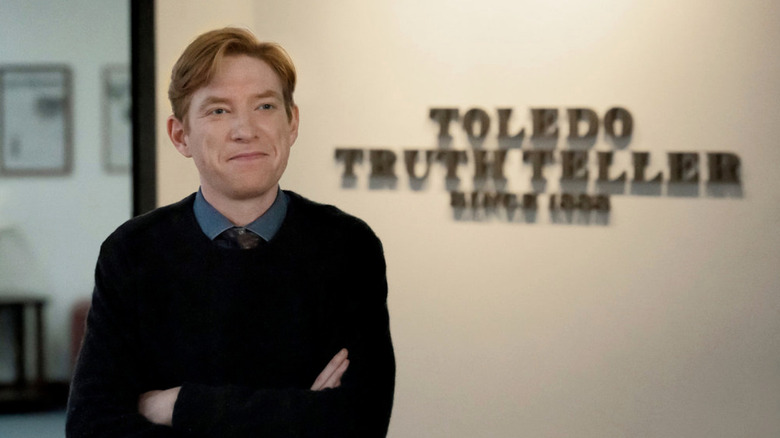
"The Paper" truly begins its story when the Toledo Truth Teller comes under new management. Ned Sampson (Domhnall Gleeson, pulling off an impressive Midwestern American accent) comes in as the idealistic new editor-in-chief of the newspaper, armed with a can-do spirit and an earnest eagerness to get the newspaper back to locally focused, objective, fact-based reporting. As Ned explains in the series premiere, he always admired Clark Kent more than Superman, because he was also saving the world, just through the power of journalism, which was clearly more achievable. Perhaps Ned's greatest attribute, other than his natural charisma and slightly awkward charm, is that his greatest weakness is his love for the kind of classic journalism that develops sources over a glass of whiskey in a smoky bar. Oh, and his other weakness is romanticizing things, or at least that's what he's been told.
Within the office of the Toledo Truth Teller, Ned finds himself dealing with a variety of personalities in the form of the newspaper's depressingly small staff. Some of them are eager to help turn the Toledo Truth Teller into a proper newspaper again, even if they're rather inexperienced in such matters, while others don't like the changing of the guard and see Ned as a threat. And finally, one of them is Oscar Martinez (Oscar Nuñez), the know-it-all accountant from Dunder Mifflin who is vehemently against having his professional life documented on film again. Thankfully, Oscar's inclusion isn't just shoehorned into the story — his presence at the newspaper actually makes sense, and his more high-handed standards and tendency to deliver flat facts just might make him a more valuable asset in this journalistic landscape.
As for the rest of the ensemble, some of the characters will feel like variations on the personalities they loved from "The Office," but even those are given enough differences to feel refreshing in their own ways.
Like The Office, The Ensemble Of The Paper Is The Show's Greatest Asset
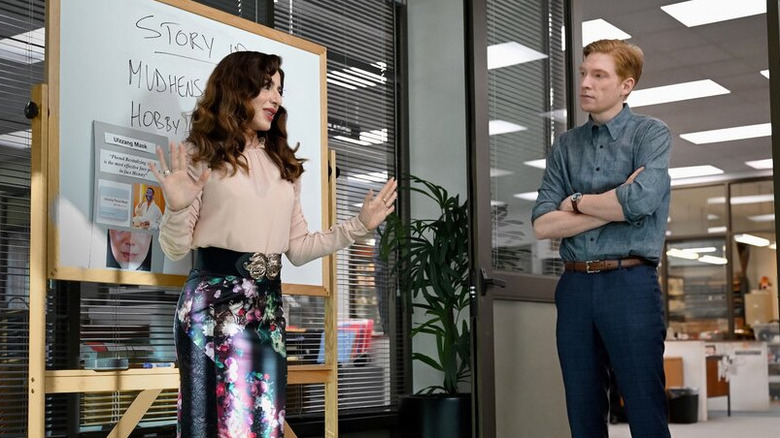
For example, one of the employees who is nonplussed with Ned's arrival is Esmerelda (Sabrina Impacciatore of "The White Lotus" season 2), the exuberantly Italian woman who is the interim Managing Editor of TTT Online, the web-based version of the newspaper, where she's opted to focus on using national news wires to fill the website with clickbait and celebrity gossip rather than real news stories. She's superficial but secretly vulnerable, eager to be on camera, a bit ditsy, and far less than thrilled when Ned becomes her boss. She's basically the Michael Scott of this operation, right down to the childish sabotage (and self-sabotage).
Meanwhile, Ned's greatest ally is Mare Pritti (Chelsea Frei), a journalist with a military background who has become jaded with her job of copying and pasting news wire stories. She couldn't be more thrilled about the prospect of turning the Toledo Truth Teller around. Though the dynamic between Mare and Ned is quite professional, there's a simmering chemistry between the two, not entirely unlike that of Jim and Pam from "The Office." But at the same time, their dynamic takes some unexpected twists and turns that keep them from feeling like they're following in the same footsteps of Dunder Mifflin's beloved couple. They make for the kind of characters you can't help but root for, professionally and beyond.
Much like "The Office," the extensive ensemble of other supporting players offers up an incredible opportunity for comedy and entertaining B-plots with varied talents across the board. Just take Tim Key, playing a corporate business strategist named Ken Davies, who basically acts as the middle man between the Toledo Truth Teller and the owner of the paper itself. Ken feels like if Ricky Gervais' character was imported into "The Paper" (complete with British accent) but made to be more of a butt-kissing weasel than a self-important dimwit, though he's also occasionally both at the same time. While he might be the most unlikeable character in the show, that's exactly what he's supposed to be, so Key is doing his job well.
However, it's the rest of the newspaper employees that help make up the most delightful and hilarious parts of the show. The likes of Melvin Gregg, Ramona Young, Gbemisola Ikumelo, and Alex Edelman pull double duty by doing their jobs in ad sales, circulation, and accounting while also getting a crash course in journalism (like learning the five W's of who, what, where, when and why) as volunteer reporters to help get the paper relaunched. Even Oscar gets in on the action, and "The Office" character actually feels like he's getting a second wind with more purpose. This also means there are plenty of hilarious conference room meetings, perhaps the most direct comedic inspiration from "The Office." It's with this ensemble that we not only get some of the funniest banter, scenarios, and character interactions, but this is where the beating heart of "The Paper" finds its rhythm.
The Paper Is On A Mission
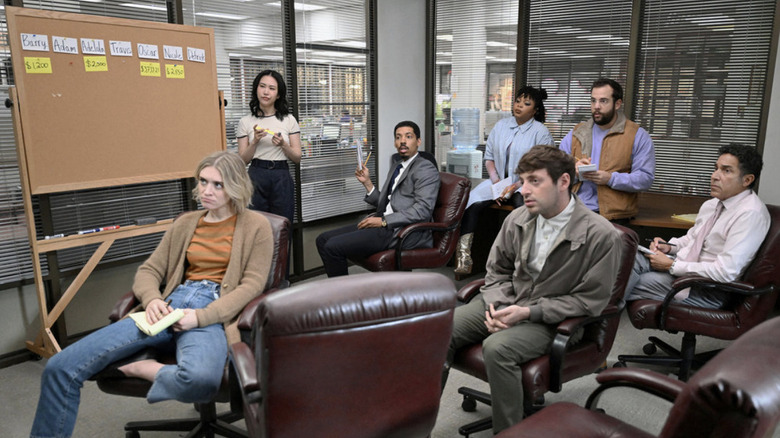
All that said, "The Paper" didn't need to be a spin-off of "The Office." While the mockumentary framing still works just as well as it did before, the comedic tone of the show itself feels much more like a typical workplace sitcom. That's not to say "The Paper" should have shifted gears away from tying itself to "The Office," but fans should keep their expectations in check if they're hoping for something exactly like the hit NBC series.
While there are remnants of "The Office" DNA, especially when it comes to Oscar's role in the first half of the series (though the references thankfully are sparing and not contrived), the show occasionally wanders into more exaggerated territory that lacks the grounded authenticity of "The Office," especially when it comes to characters like Esmerelda and Kevin. Honestly, even Ned has a tendency to feel more like a prototypical sitcom leading man in a romantic comedy rather than a genuine person. But that's actually not a bad thing! It just means that audiences need to adjust their expectations for what "The Paper" truly is.
That brings us back to the aforementioned beating heart of "The Paper." As the series picks up steam and the supporting players learn the basic rules of journalism, plenty of hilarious moments come from their misunderstanding and confusion of how to be a reporter. Even Ned, despite his background in journalism from college, doesn't make the best decisions in his pursuit his journalistic ambitions (or his romantic life). But in addition to mining this material for comedy and an extremely entertaining story, it feels like Greg Daniels and co-creator/co-showrunner Michael Koman (of the hilarious "Nathan for You") are also hoping to remind Americans what real journalism used to be while showing them the tragedy of what once-great newspapers have become. They have an episode amusingly taking aim at the concept of churnalism, and they even go so far as to dedicate an entire episode to a conflict of interest that has become more prominent in recent years: corporations owning media outlets, allowing them to control their own narrative in the public spotlight.
There's another nice little wrinkle in "The Paper" that comes in the form of occasional, black and white newsreel flashbacks that show the audience what the Toledo Truth Teller used to be like in its prime: a bustling newsroom, printing presses churning out fresh papers, an editor-in-chief with vigor and conviction played by the great Tracy Letts. These moments serve as a glimpse back to a time when the newspaper was king and real information was valued, as opposed to the frequent infotainment and pundit-spewing bias that most cable news and "newspapers" are known for today. Even the title sequence paints the unfortunate reality of today's uses for newspaper in a slightly satirical, though sadly accurate light.
"The Paper" doesn't walk the same path as "The Office," but that's more of a feature than a bug. It's less brash and more polished, but Daniels and Koman have delivered the rare comedy series that is as nobly valuable as it is just plain funny. It has no shortage of charisma, and it lands firmly with an admirable and uplifting spirit. If this is how "The Paper" begins, I can't wait to see where it's going.
/Film Rating: 8.5 out of 10
All 10 episodes of "The Paper" debut at once, exclusively on Peacock, starting on September 4, 2025.
If you're looking for the easiest way to keep up with all the major movie and TV news, why not sign up to our free newsletter?
Read the original article on SlashFilm.
